#so while both him and Agamemnon were the cause of death of kids‚ their action are not the same so there's no double standard regarding
Text
I keep thinking of that reply in my Odysseus/Agamemnon post about how I regard differently Odysseus' and Agamemnon's actions, while acknowledging that at times Agamemnon is written as a sweet man and Odysseus is always straight up shitty, and how it was taken as some sort of defense for Agamemnon and as a form of pointing out the double standard; and that wasn't at all what the post was about for me, even though I can see where they were coming from. To be honest, given I didn't imagine it would spread anywhere other than my own blog, I didn't explain myself very well (or at all).
The fact is that when I talked about Odysseus not caring about hurting someone else's child to start and end a war I was indeed comparing his actions to Agamemnon's, but my words about supporting Odysseus' wrongs and cheering him in his terrible actions, while in a joking tone, weren't entirely a joke. I do think that Odysseus does some very shitty acts, and some quite terrible ones depending on the sources. That's a fact, that he does is at the core of his characterisation and it's what makes him so much fun; but not even when he is at his most cruel does he harm his family, his own son. Agamemnon, while sweet and loving at times in some texts, at his worst is willing to sacrifice Iphigenia. When readers regard with more sympathy Odysseus over Agamemnon despite both being responsible for children dying, I don't think there's a double standard in this aspect at all considering it's never his own kid Odysseus harms. And that's the key, I think.
Odysseus and Agamemnon have very different priorities, a very different view on loyalty and duty. It could be said that Agamemnon acts out of selfishness, but it could also be read in a kinder light, saying that Agamemnon is ruled by the gods first, and by his role as head of the achaeans; Agamemnon is not entirely himself. In opposition we see Odysseus acting perhaps mainly for himself and his own family and men; yes, he is a king, but he has not the role Agamemnon has. As a consequence, Agamemnon submits his family's wellbeing to the war, to the gods, while Odysseus stops the plow before hurting Telemachus but is (depending on the source) the cause of Iphigenia's sacrifice and Astyanax's death.
Both Odysseus and Agamemnon have reasons to support their actions, and both can be sympathised with; it's fiction after all. When it comes to fiction, at the end of the day which character a reader is drawn to or sympathises with is mainly an issue of personal taste, but I suppose it also implies a certain level of one's own views or preferences on morals, what makes us find certain actions more justifiable, or tasteful (perhaps that's a more accurate word), than others. Agamemnon sacrificing his daughter, no matter how sympathetic or understandable the reason, generally sits worse on people than Odysseus doing the same with someone else's kids, because they're someone else's. This different emotional reaction they provoke has place not just metanarratively, but also inside the very story; it is narratively significant, given it determines how their arrival home plays out, how their wives react to them, and thus their futures. Ultimately it determines whether they live or die.
I think both terrible acts go in line wonderfully with each characterisation, showcasing the role they hold in their world, what they value, what they care for, what they're willing to sacrifice for themselves and the others, how much of their own they're willing to give and bend. While looking at the wider picture it could perhaps be drawn that Agamemnon is the better person out of the two, but Odysseus' selfish actions are perhaps easier to empathise with, especially from a modern viewpoint. Odysseus is treacherous and prone to betrayal, but not against his own; Agamemnon follows the rules of the gods. How fitting in that context that Odysseus doesn't die at the end of his story, that he cheats the death heroes so often are fated to, almost as if cheating the narrative itself, bending the rules of the world he is ascribed to; how fitting in the context of those texts that point towards Sisyphus being his father. But that's another topic, and I've already talked a lot.
#Don't get me wrong. Odysseus is super shitty and this is a 'pick your poison' kind of situation#But I don't really think there's a double standard when it comes to the kids situation given that Odysseus doesn't sacrifice his own kid#I really think that's what lies at the core of this. Does that make him shittier and more selfish and a worse person? Actually yeah perhaps#But we are no kings with thousands of people depending on our decision yet cringe at the idea of hurting people close to us#It feels like betrayal. And this is where the moral preference takes the role. Which do you prefer? The one that would betray their family#for the greater good or the one who'd sell the world for their family and themselves? It's interesting because#while in fiction the first option is often the most frown upon while selfish actions for the beloved are easy to sympathise with‚#in reality these are usually worse regarded. I didn't want to go there because I already wrote so much it didn't fit in the tags#but I actually think the same thing happens with Galahad/Lancelot. Heathcliff/Edgar I'd say has a somewhat similar situation going on#There are many many examples but mainly I was thinking of Galahad and Lancelot#So this is not an 'Odysseus did nothing wrong'. This is an 'Odysseus did many things very wrong but he didn't kill his son#so while both him and Agamemnon were the cause of death of kids‚ their action are not the same so there's no double standard regarding#the particular action of sacrificing Iphigenia. In fiction that kind of betrayal makes characters often unlikeable'#I guess that action 'stains' the view under which Agamemnon's actions are seen and so his character is often seen under a darker light#He is presented a bit as an antagonistic presence opposed to Achilles who is very popular so I guess that also influences this?#Anyway I've been elated by the musical causing Odysseus art and posts but I do have noticed that he is very goodified in it and that#it has influenced how he is being regarded around here (the way it happened with The Song of Achilles as well I suppose)#And I must say I like that less. He is shitty in a fun way but not in a light way. He is very shitty#Definitely not better than Agamemnon depending on the perspective you take. I can't believe I'm 'defending' Agamemnon#He is not my thing at all I'm all for selfish actions for oneself and the loved ones through manipulation‚#lies and scams and letting the world drown if needed. In fiction Lancelot's‚ Odysseus' and Heathcliff's actions are a lot more preferible#to me than Galahad's‚ Agamemnon's and Edgar's. But yeah#I ALSO didn't want to go there because again it would have take me forever and I would run out of tags (yet here I am)#but there's also a Priam/Hector/Paris comparison in how they act and how they're regarded to be drawn here#Agamemnon/Iphigenia‚ Priam/Hector/Paris‚ Odysseus/Telemachus. And that is not even including everything with Elektra/Clytemnestra/Orestes#or Oedipus and his own family for that matter#But yes. I'll better shut up already. I'm talking a lot more than I intended#I just found that discussion super enthralling and I couldn't stop thinking about it. I still can't#I talk too much#I should probably delete this later
6 notes
·
View notes
Text
Treat Your S(h)elf: The Silence of the Girls by Pat Barker
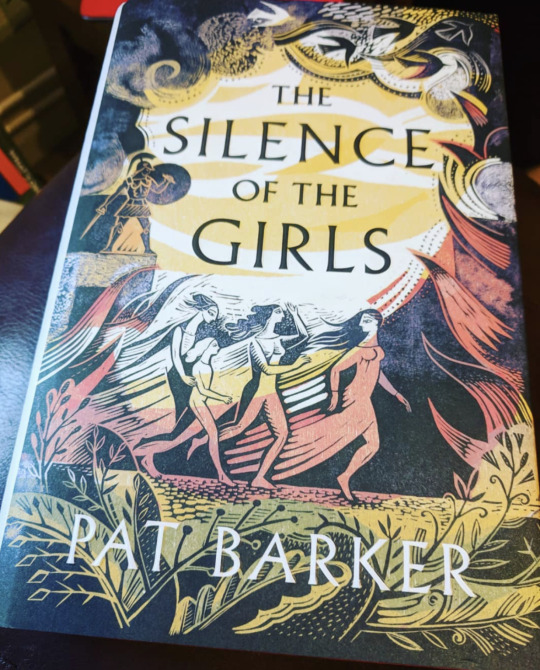
We’re going to survive - our songs, our stories. They’ll never be able to forget us. Decades after the last man who fought at Troy is dead, their sons will remember the songs their Trojan mothers sang to them. We’ll be in their dreams - and in their worst nightmares too.
- Pat Barker, The Silence of the Girls
“It’s always hard on women, when a city falls.” Briseis, former princess of the Trojan city of Lyrnessus, has been Achilles’s slave for several months when someone she knew in her old life says these words. From the ancient world to our modern world there is this ugly and unspoken line of rape as a weapon of war. History is replete with examples. In the 20th-century where Nazis raped Jewish women despite soldiers' concerns with "race defilement" and raped countless women in their path as they invaded the Soviet Union and then in Berlin 1945 Russians in turn went on a brutal raping spree to punish the Germans. In the bloody Balkan wars in the 1990s, Serbian forces tortured and summarily executed scores of Muslims and Croats. In the Iraq war and the many conflicts in Africa in the 21st Century, rape is systemically used to subdue a defeated enemy. History shows the ugly truth that women’s bodies have always been viewed as the spoils of conflicts waged primarily by men.
The issue of rape in war is something that has always sat uncomfortably with me ever since I did my stint as an army combat helicopter pilot in Afghanistan. From my high vantage point I felt a detachment from the electronic battlefield - for everything was viscerally seen from my helmeted eye patch visor lens and not the naked eye. I couldn’t look people in the eye as as soldier on for patrol would have. The fear and sweat is the same but the risk is different. Soldiers on patrol or on a mission risk the constant threat of ambush, sustained attack under mortar or fire fights as well as the ever present danger of being blown up by an IED by accident. Pilots risk being coming under attack too by being ambushed by RPG rocket fire or coming under fire from below. Worse, was to think if you got hit and you had to bail and you were all alone, survival and evasion from capture becomes fearfully paramount. Of course they train you for this until it hopefully becomes muscle memory in how to survive and take evasive action from being captured and resisting as long as you could under interrogation. But as a female pilot the unspoken fear that dare not speak its name was ever present: the fear of rape.
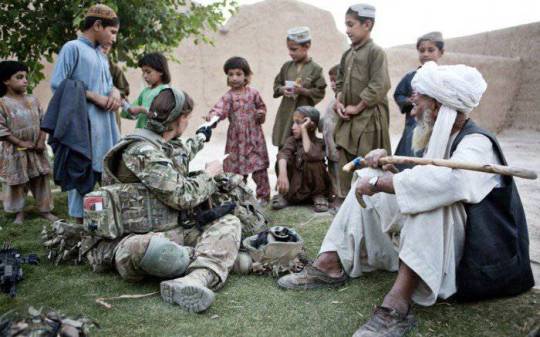
I’m not sure my brother officers - no matter how sincere and well intentioned they were because we were all fiercely protective of one another - really understood what the word ‘rape’ means for a woman. Indeed a male friend and ex-army colleague said to me in jest don’t ever kid a man about kicking him in the balls because it’s one thing every man can imagine feeling but would find it hard to explain the excruciating pain when a man does get his balls bashed in. I don’t think the two ‘experiences’ are the same obviously but I understand how hard it is to articulate what it might feel like. I never really allowed myself to be consumed by the fear of what might happen if I ever got shot down and was captured but instead I made sure to focus on my job. It never really became pressing issue for me throughout my time in on the battlefield. I was lucky I got out in one piece despite a few close scrapes along the way.
I did hear awful and terrible stories from my oldest brother who served in the Iraq War of the raping of Kurdish women by Iraqi forces. It sickened him and left him hollow the the things he witnessed first hand. Through the charitable work of ex-veterans I have come across refugee woman who shared their harrowing stories of how they were violently and systematically raped as war booty and as primal assertion of victor dominance and control.
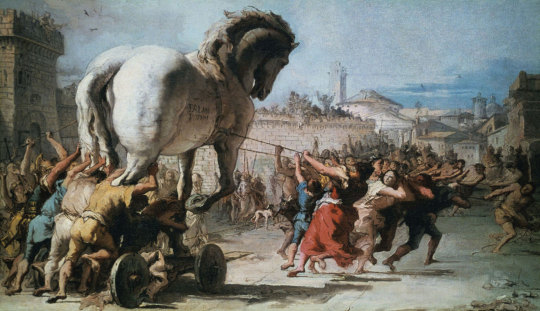
I was thinking about all these things as I read Pat Barker’s novel about one of the most famous wars of all, telling the story of the siege of Troy from the point of view of the local Trojan women taken by the Greek forces. It’s The Iliad as seen through the eyes of 19-year-old Briseis, the Queen of Lyrnessus who’s taken as Achilles’s “bed-girl”, his “prize of honour” for mass slaughter.
Barker’s not the first to turn to the classics for inspiration. It’s popular practice these days. Kamila Shamsie’s Home Fire and Michael Hughes’ Country, for example, transpose classical stories onto contemporary settings. The Silence of the Girls is yet another much welcomed book to offer a fresh perspective on Homeric women, following Madeleine Miller’s brilliant Circe. But while Miller’s reinvention of literature’s first witch brilliantly evoked a world of ancient magic in retelling The Odyssey from the witch’s point of view, not that of the warrior she waylays on his journey home, Barker’s story has its feet very firmly on the ground. Yes, the gods are still there – you can’t tell the story of the Trojan wars without them, after all. The gods remain mostly off stage but they are present in the background, magically restoring the mutilated dead body of Hector. The sea goddess Thetis, Achilles’ mother, is a briny, frightening presence, as are the dark shore and the waves by which the whole horrible story takes place. Apollo still sends a plague, Achilles is the son of a sea goddess who brings him divinely forged armour and Hector’s body is magically restored to freshness after being pulled behind Achilles’s chariot.
But what really stands out are not heavenly allusions but the dirt and filth and disease and sheer brutal physicality of the Greek army marauding everything that stands in their way to Troy - there’s no magic here to ease the pain and trauma of rape or murder or even to help exact revenge. And while Achilles’ divine mother makes an appearance, and Apollo is beckoned by Briseis to bring about a plague, the gods remain on the peripheries of this story. If Circe, which chronicles the life of its titular character, is very much about the gods and their egos, then The Silence of the Girls, however, is very much about humans, their egos and their wars - both personal and political.

In all this Barker gives female characters such as Circe and Briseis the voice they’ve traditionally been denied, readers glean a different version of events behind the Trojan War epic myth. “Great Achilles. Brilliant Achilles, shining Achilles, godlike Achilles…How the epithets pile up,” Briseis begins. “We never called him any of those things; we called him ‘the butcher’.”
In The Iliad, a poem about the terrible destruction caused by male aggression, the bodies and pretty faces of women are the objects through which men struggle with each other for status. The women are not entirely silent, and goddesses always have plenty to say, but mortal women speak primarily to lament. They grieve for their dead sons, dead fathers, dead husbands and dead protectors; for the city of Troy, soon to fall, and for their own freedom, taken by the victors of war. Andromache pleads with her Trojan husband Hector not to leave her and their infant son to go back to fight Achilles. She has already endured the sack of her home city by Achilles, and seen the slaughter of her father and seven brothers, and the enslavement of her mother. If Hector dies, their child will be hurled from the city walls, Troy will fall and Andromache will be made the concubine of the son of her husband’s killer. Hector knows this, but he insists that his own need to avoid social humiliation as a battle-shirker trumps it all: “I would be ashamed before the Trojan men and women,” he says. He hopes only to be dead before he has to hear her screams.
Barker’s absorbing prose puts the experience of women like Andromache at the heart of the story: the women who survive in slavery when men destroy their cities and kill their fathers, brothers and children. The central character is Briseis, the woman awarded to Achilles, the greatest Greek fighter, after his army sacks one of the towns neighbouring Troy. Agamemnon, the most powerful, although not the bravest, of the Greek warriors – a character whose downright nastiness comes across beautifully in Barker’s telling – has lost his own most recent female acquisition and seizes Briseis from Achilles. Achilles’ vengeful rage against Agamemnon and his own comrades, and the subsequent vast death toll of the Greeks and Trojans, is the central theme of The Iliad.

Homer’s poem ends by foreshadowing the fall of Troy in the death of its greatest fighter, Hector. Barker’s novel begins with the fall of another town: Lyrnessus, Briseis’ home, destroyed by Achilles and his men. We then see that the fall of a city is the end of a story only for the male warriors: some leave triumphant and others lie there dead. For the women, it is the start of new horrors.
Barker’s subject has long been gender relations during conflict, along with the machinations of trauma and memory, so she’s in her element here. Her blood-drenched battle scenes are up there with the best of them, and she shows a keen understanding of the “never-ending cycle of hatred and revenge” fuelling the violence. Her focus, however, is that which takes place off the battlefield, inflicted on the women in the “rape camps.”
Barker keeps the main bones of the Homeric poem in place, supplementing Homer at the end of the story with Euripides. His heartbreaking play The Trojan Women is, like Barker’s novel, a version of the story that shifts our attention from the angry, destructive, quick-footed, short-lived boys to the raped, enslaved, widowed women, who watch their city burn and, if they are lucky, get a moment to bury their slaughtered children and grandchildren before they are taken far away.
One of Barker’s most tear-jerking sequences is lifted straight from Euripides: the teenage daughter of Priam and Hecuba is gagged and killed as a “sacrifice” on the dead Achilles’ tomb, and then Hecuba is presented with the tiny corpse of her dead grandson, a toddler with his skull cracked open. The girl’s gagged mouth and the child’s gaping brains conjure a gruesome twinned image for the silenced voices that should tell of the horror and pity suffered by the victims of war.
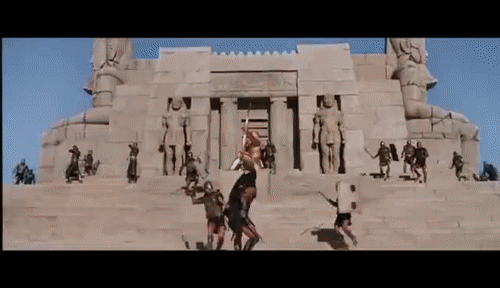
For most of Barker’s novel, Briseis is the first-person narrator, but in the final part, the narrative is intercut with third-person chapters told from the point of view of Achilles. We never get as close to Achilles as we do to Briseis, but he is a compelling figure in his fascinating combination of brutality and civility. Like Siegfried Sassoon in Barker’s 1991 novel Regeneration, this Achilles has the soul of a poet as well as of a killer and hunter: he is a man whose physical courage and compulsion to fight sit uneasily with his clear, articulate awareness of the futility of war.
But Achilles, however fascinating he may be, is not then at the centre of this story. Still, the novel does provide a moving, thought-provoking version of what is perhaps the most famous moment of The Iliad: when the old king Priam makes his way, alone and unarmed, through the enemy camp, to plead with Achilles to give back the mutilated body of his son, Hector. Barker twice quotes Priam’s Homeric words to Achilles: “I do what no man before me has ever done, I kiss the hands of the man who killed my son.” Barker lets us feel the pathos and pity of this moment, as well as the pathos of all the many young men who die violent deaths far from home. We glimpse, too, Achilles’ alienation from his own “terrible, man-killing hands”, which have caused so many deaths.

Briseis has a powerful riposte to Priam’s words, weighing this unique encounter between men against the myriad unremembered horrors suffered by women in war. “I do what countless women before me have been forced to do. I spread my legs for the man who killed my husband and my brothers.”
Reduced to objects, they’re catalysts for conflict – Barker’s Helen inspires ribaldry not worship, “The eyes, the hair, the tits, the lips/ That launched a thousand battleships...” chant the soldiers – blamed for inciting hatred between men. Or they’re regarded as the victor’s spoils, claimed along with cattle and gold.
Briseis is both. Taken as a slave, Achilles and Agamemnon then feud over her: “It doesn’t belong to him; he hasn’t earnt it,” fumes the former. Men - Greek and Trojan alike – are afforded the privilege of vocalising their pain and loss, while women have to repress their suffering. “Silence becomes a woman,” they’re told, even when they’re free.
No longer an issue of decorum, now it’s about staying alive. “I do what no man before me has ever done, I kiss the hands of the man who killed my son,” declares Priam when he prostrates himself before Achilles begging for Hector’s body. “And I do what countless women before me have been forced to do, Briseis thinks bitterly, “I spread my legs for the man who killed my husband and my brothers.”
Barker has a very clear feminist message about the struggle for women to extricate themselves from male-dominated narratives. In the hands of a lesser writer, it could have felt preachy and woke but she masterfully avoids that. The attempt to provide Briseis with a happy ending is thin, and sometimes the female characters’ legitimate outrage seems a bit predictable, as when we hear Helen thinking: “I’m here. Me. A person, not just an object to be looked at and fought over.”

The novel has some annoying anachronisms, such as a “weekend market” (there were no weekends in antiquity), and a reference to “half a crown”, as if we were in the same period as Barker’s first world war novels. One wonders if any woman in archaic Greece, even a former queen, would have quite the self-assurance of Barker’s Briseis. But, of course, there is no way to be sure: no words from women in this period survive but Barker is surely right to paint them as thoughtful, diverse, rounded human beings, whose humanity hardly ever dawns on their captors, owners and husbands. This central historical insight feels entirely truthful.
Barker has a quasi-Homeric gift for similes: “that shining moment, when the din of battle fades and your body’s a rod connecting earth and sky”, or Achilles’ friend Patroclus dying, “thrashing like a fish in a pool that’s drying out”. There is a Homeric simplicity and drive in some of the sentences: “Blood, shit and brains – and there he is, the son of Peleus, half beast, half god, driving on to glory.” She is Homeric, too, in her attentiveness to what happens between people, and to the details of the physical world: the food, the wine, the clothes, the noise and the feel of skin, blood, bones, crackling wounds and screams. Barker, like Homer, understands grief and loss, and sees how alone people can be even when they are crying together. Loneliness in community is one of the major themes of this book, as it is of The Iliad.

Angry, thoughtful, sad, deeply humane and compulsively readable, The Silence of the Girls shows that Barker is a writer at the peak of her literary powers. You sense her only priority is to enlarge the story that we all know and she adds to it magnificently.
I have always enjoyed reading Pat Barker especially her enviable experience of writing about military life in her earlier novels and here in this book it shines through in the depiction of the Greek forces. The men are dehumanised by the wars they have created. This is primarily a book about what war does to women, but Barker examines what it does to men too. I was disturbed by the magnificently poignant final section which can’t help but make you reflect on the cultural underpinnings of male aggression, the women throughout history who have been told, by men, to forget their trauma. When Briseis is told to forget her past life, she immediately knows it is exactly what she must not, can not do: “So there was my duty laid out in front of me, as simple and clear as bowl of water: Remember.”
Briseis knows no one will want to record the reality of what went on during the war: “they won’t want the brutal reality of conquest and slavery. They won’t want to be told about the massacres of men and boys, the enslavement of women and girls. They won’t want to know we were living in a rape camp. No, they’ll go for something altogether softer. A love story, perhaps?” But even so, Briseis, for all that she must bear, understands eventually that the women will leave behind a legacy, though not in the same vocal, violent way the men will.
“We’re going to survive,” she says, “our songs, our stories. They’ll never be able to forget us. Decades after the last man who fought at Troy is dead, their sons will remember the songs their Trojan mothers sang to them. We’ll be in their dreams - and in their worst nightmares too.”
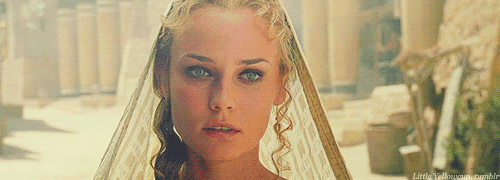
I felt disconcerted reading this and also very moved. As much as I love the Classics and firmly believe in it providing the foundational building blocks of our Western civilisation I also have to pause and remind myself that heroic behaviour, something the greatest of the Greeks are known for, isn’t anything admirable when viewed from the lens of the women they abuse. Heroism can be tainted by the dark side of one’s nature. However pure one soldier’s sacrifice for another can be, so there is the bestial side of us where the chains of civilised moral behaviour are unshackled and left to satiate our primal instinct for cruelty, conflict, and domination. Indeed what Barker does is be a much needed corrective because just as you think her perspective of the Greek heroes may be softening, she pulls back to remind you of Odysseus tossing Hector’s baby from the battlements, or Achilles’s casual butchery. “It’s the girls I remember most,” Briseis says. This then is a story about the very real cost of wars waged by men: “the brutal reality of conquest and slavery”.
In seeing a legend differently, Barker makes us rethink who gets to write history but also to remind us of our tainted human condition. There is no god in the machine to sort out most violent conflicts and situations with a thunderbolt here. There are only mortals, with all their flaws and ferocity and foolishness. And we all have to live with that but not I hope in silence.
#treat your s(h)elf#books#reading#personal#pat barker#barker#the silence of the girls#troy#greek#classical#antiquity#achilles#briseis#andromanche#trojan war#war#rape#violence#book review#literature
86 notes
·
View notes